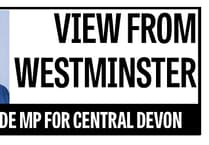LAST week I was back in Westminster after the Christmas Recess, and as I mentioned in my look ahead to what the year might bring, Parliament was busy!
The Procurement Bill had its second reading in the House of Commons on Monday. The Bill will establish a set of transformative new rules which rip up bureaucratic EU regulations and make it easier for small UK businesses to win more of the £300 billion worth of contracts for goods, services, and works that the government buys each year.
Value for money will be at the heart of any purchase decision the government makes, along with wider social and environmental factors. This is great news for local business, as the ability to create more local jobs will hold greater weighting in deciding contract tenders – a Brexit dividend for sure!
The Stamp Duty Land Tax (Reduction) Bill finished its passage through the house of Commons this week ensuring the Stamp Duty cut announced during the mini-budget in September last year remains in place until the end of March 2025 helping more people own their own home.
But we need more homes to buy. Now that the principle has been established that no area should have to take more housing than it needs and which adversely changes its character, a scheme for new towns and villages will need to be considered to enable the homes we need to be delivered.
Last week the government announced a new energy support package for businesses. It doesn’t go as far as the last scheme did, and for those struggling this new version of the support scheme will fall short of what they need. One of the challenges which needs to be grasped is ensuring fair competition.
I wrote to the Chancellor last year having seen energy companies send quotes to local businesses for increases of 500%! That simply isn’t sustainable. If that means beefing up the regulator’s powers, then that must be done, and quickly, if government support is to be limited.
Legislation to tackle the unfair disruption to people’s lives caused by strike action that the government hinted at bringing in at the end of the year was formally introduced to the House last week. It is right that the Government makes changes to mitigate the impact that strikes can have on society, particularly as regards emergency services.
They are there for ‘emergencies’ and that should be the case strike or not. While workers absolutely should have the right to participate in industrial action, we also need to keep the country running. I am puzzled as to why Labour should be determined to repeal any such legislation if the right balance is achieved– surely they should want people to be safe.
Getting our NHS working again is for us all a priority. While I was pleased to see Steve Barclay announce so many initiatives this week including schemes to enable those able to leave hospital to move to an intermediate care setting in care homes (confusingly in some cases called hotels) so much more needs to be done.
The additional £200 million the government is giving local areas to buy up extra care home beds to tackle the backlog in our hospitals will make a difference. Maybe it’s time to review again creating more intermediary care and more cottage hospitals!
But in the end, we have to face up to tackling the recruitment and retention problem, to the need to train substantially more doctors and nurses and to the need to deal with the bureaucracy that stops doctors and nurses be the best they can be.
This will involve change in the way doctors and nurses do things and greater use of technology. It will also mean us as patients all adapting to a new range of services delivered in a different way by a wider range of medically qualified professionals. None of us like change, but change we must.
If you would like to book a surgery appointment or raise a specific issue, please call my office on 01626 368277 or email [email protected]




